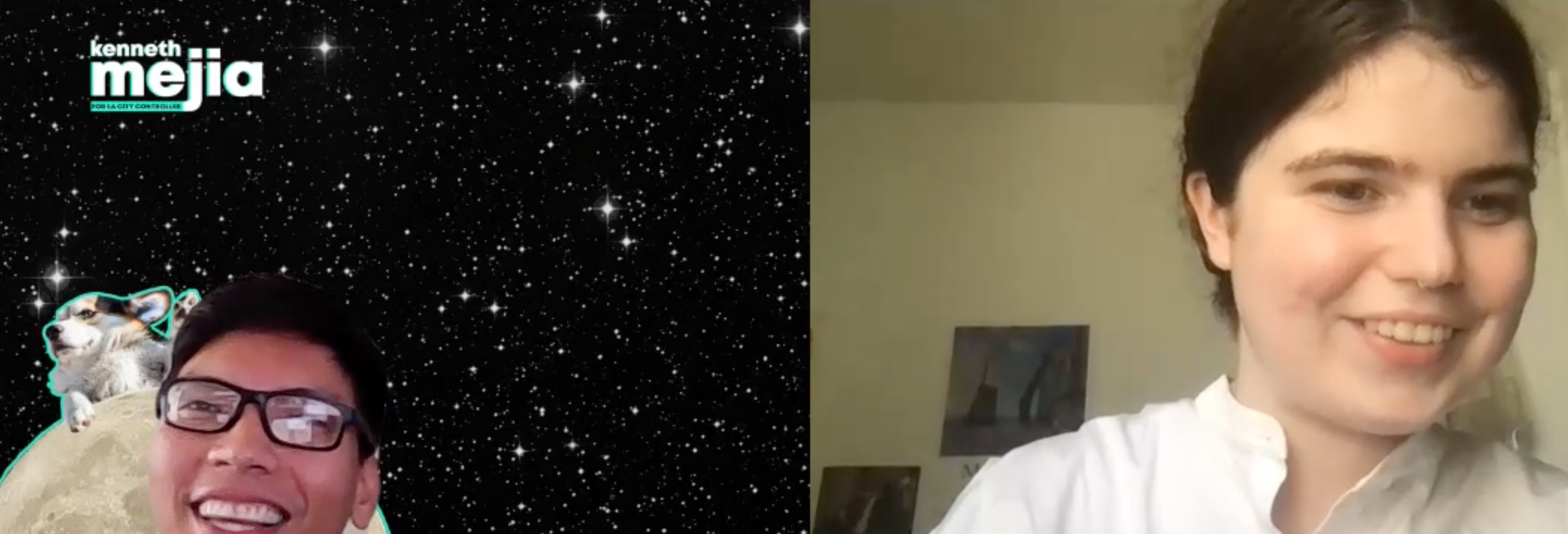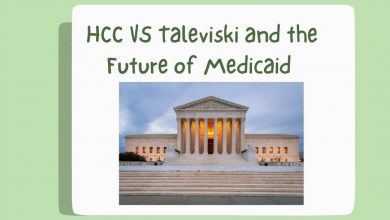Meet Kenneth Mejia, the Candidate Running for L.A. Controller on a Radical Platform: Doing His Job

Image Description: A Zoom screenshot shows candidate Kenneth Mejia (left) talking to the author (right). Both are smiling.
This interview took place on April 6, 2020. The transcript has been edited for length and/or clarity. Since the interview, Kenneth Mejia has been endorsed by the LA Times Editorial Board.
Fier: Who are you as a person? If you had to describe yourself in one or two sentences what would you want Angelenos to know?
Mejia: I was born and raised in Sylmar, in the San Fernando Valley, by a single mom, immigrant household. I feel like she’s the one who instilled education in me, especially college education and helping others, because that’s what she wanted to do. So that’s what I do in terms of my organizing around housing advocacy, tenant and unhoused rights. Professionally I’m a Certified Public Accountant with 11 years of account and auditing experience.
Some great sentences to describe us are that our campaign for City Controller is running to provide radical transparency on the city’s finances and processes, like its departments and programs. Second, I would say that we’re running to hold power accountable, because the city gets away with a lot of things and we want to make sure people are held to account, or that the public at least knows what’s going on.
Fier: What inspired you to start your campaign for City Controller?
Mejia: The City Controller is the city’s accountant and auditor, and so I thought it made perfect sense because that’s my job. I also have progressive values that I think would work well with this office. It’s so important to have someone who cares about the community and can also apply technical knowledge and skills. I think this is right up my alley, which is why I decided to run.
Fier: I’m in Westwood right now at UCLA, and I know that Paul Koretz, who currently represents our district, is one of your opponents in the race. I was wondering if you could tell me what sets you apart from the other candidates, particularly Koretz and other career politicians.
Mejia: That’s a great question. I think number one is knowledge and qualifications. Paul Koretz has no accounting or auditing experience, he indicated this on a questionnaire to the Council district 5 homeowners association. This just goes to show that this position has been used as a placeholder position, like a game of musical chairs. That’s why no one knows much about this position, or even that it exists. A second difference is that we’re a campaign of activists and organizers, and we’re out there on the front lines listening to and helping people on the issues that matter to their lives. I think people want to see this position be used for good, instead of going to someone who’s inexperienced.
Another big difference is that we’re one of the few campaigns running for this position that’s an outsider—a lot of our opponents are working for city hall right now. No one really knows why Paul Koretz is running. He has a website with no platform, and seems to be relying on his endorsements and big money. That’s another difference—we don’t take corporate money like he does. The way we see it, if you’re running to be the independent watchdog, why not be truly independent?
Fier: I certainly can’t speak for everyone, but I think a lot of other people are excited to hopefully have someone who actually does their job in government, instead of taking the salary without being at all transparent. Another difference that I noticed is you guys are already doing the work. I used your affordable housing database in a project last quarter, and you’ve made other user-friendly resources like it without even being in office yet. I’ve never seen another campaign do that. Without any examples to draw from, what made you decide to focus on these projects during the race?
Mejia: Totally, most important is that we’re already doing the job. I know what financial information and city data look like from a user perspective, so if I can visualize what I and people in general want to see, why not create that? The Controller provides data and maps, and lots of city websites are archaic and hard to use. That’s why our campaign makes it a priority to get data and make it understandable and accessible. This information is helpful to people, and the city shouldn’t hoard it, which is what they do. They just keep it, or they make a terrible website.
Fier: I know the election is coming up on June 7 and you’ve already been campaigning for a while, so I’m wondering what some of the biggest barriers to your campaign have been throughout the race, and if there’s any areas where you feel like you have an edge over the other candidates?
Mejia: I’d say being an outsider is the biggest barrier. Especially when you’re running against a sitting city councilmember, no one wants to endorse you, even though people like you. It’s a shame, but it’s politics and we expect it, so we campaign as if we won’t get any big endorsements. But we’re supported by community organizations and people on the ground, which is what we’re proud of. There’s folks helping us from K Town For All, StreetWatch LA, Sunrise Movement LA, Youth Climate Strike, BLM LA, and LA Tenants Union. Our campaign is people-oriented, and campaigning is a great way to get people involved, not only in politics but activism as well. We have 800 volunteers, and some of them are being introduced to organizing for the first time and are now joining their local mutual aid organizations. It’s a great collective of people, and we’re very diverse too.
Fier: Where did you start your political journey, and how has your political philosophy evolved over time?
Mejia: I started getting more politically involved in late 2015 when Bernie Sanders was running. I think he opened a lot of people’s eyes to politics-as-usual, and he was one of the first politicians to actually say what was on people’s minds, and this particularly affected youths. It was eye opening because you never see that, you just watch politics and think there’s nothing we can do because no one is being held accountable. So Sanders inspired that initial interest in politics.
Then in 2018 I decided to run for congress. I chose to register with the Green Party, though I’m a Democrat now, because there’s more parties than the two main ones and their platform looked great: healthcare for all, 100% clean renewable energy, legalization for immigrants, ending the military industrial complex, and eco-socialism. Our campaign made history as the highest vote-getters of any Green Party candidate in the 2018 elections—we got close to 30% against a democrat in the general election. But those were still tough times, that was when Trump was in office and no one wanted to hear me out. We’re not there yet, but I definitely feel like more people are starting to pay attention, especially in the last year or two. People are more aware of local politics and politicians too, and they’re seeing that liberal and democratic policies aren’t as good as people say they are. We’re criminalizing homelessness and poverty, tenants are getting evicted, and Black and Brown people are still being abused by the police. So I think a lot of people are starting to pay attention, and they’re focusing on actions instead of words. That’s what I want to focus on as a candidate for City Controller—calling out the city for their hypocrisy or their failures.
Fier: Your campaign so far has been entirely grassroots funded. If you’re elected, how would you continue community outreach and dialogue to ensure people can stay involved and engaged? How would you include Angelenos in this process of calling out the city?
Mejia: I think we’ll do weekly Zoom or Twitch streams to educate the community on City Controller updates, financial literacy and how to use the city’s websites. Another problem right now is that it’s hard to communicate with the Controller’s office. I have to send out a public records request for even general information on their office. One of the biggest frustrations of local politics is that you can’t get a response from anybody. To change this we’ll set up a message board or email and try to respond to everyone in less than a week, even if it’s just to tell them why we can’t share certain information right now.
Fier: From what I know, the Controller doesn’t have any legislative powers or ability to focus city priorities on one area. Given the limited scope of the role, how do you see yourself making change as the Controller, and how would your actions impact other parts of government?
Mejia: You’re right that the Controller doesn’t have policy-making power. We can’t pass rent control or stop oil drilling, or even defund the police. But we plan to affect change through transparency, by the hugely important work of putting data and information out there. I think knowledge is power, and if people just know where their money is going they can make a better case for funding, resource allocation, and changing policies. So that’s what our campaign has tried to do by making information known, because then you all can take it and lobby your city councilmember.
The other power the Controller has is auditing city departments to get a look at their internal workings. We pay them a certain amount of money, and we deserve to know what they’re doing with it. Auditing lets us ask questions like: Are you hitting your performance measures? Are these the right performance metrics? Are you getting the job done efficiently and effectively? This can help us root out waste, fraud, corruption and inefficiencies, and this can then effect change in the City Council who will hopefully take our findings and suggestions and do something about it. But most of the power is with you, which is why we’re making this information public. If they don’t listen to me, you all have to get out there and demand change.
Fier: I can definitely relate to some of the problems you’re describing in terms of my interactions with UCLA Administration. They’re also incredibly privileged, inaccessible, and untransparent, and they make decisions that impact everyone except them. What lessons can UCLA students learn from your campaign about organizing in the face of this kind of power?
Mejia: Most important I think is constantly putting out information that is useful for people, and that can spark an interest in them to learn more about issues that affect UCLA students. For example, if there’s a lot of funding for something but programs people care about stay underfunded. What we’ve seen is that people will use our data to go into their City Council meetings and organize. So find issues that are important to students, and make information about them known to the point where those in power cannot ignore you. When we found out that half the American Rescue Plan COVID-19 relief funds were going to the LAPD, the city simply couldn’t ignore that. You had journalists calling the City Administrative Officer and the Controller’s office. Keep putting out information, and don’t give up. A lot of people want to get activated, they just need something to light the fire, and transparent and accessible information is one of the best ways to do that and bring more people in.
Fier: One of the things I’m most impressed by is the coalition you’ve built. At UCLA we have a lot of different interest groups. I’m in the Disabled Student Union, but there’s all sorts of other student groups that need to work together more. When we don’t the administration pits us against each other, so what you’re doing is really inspiring.
Another important issue is simply getting people to turn out to vote. Most college students don’t know what the Controller does, and we’re all really busy and exhausted. So what would you say to these students to pique their interest? Why should we be interested in this race, and how does the position of Controller connect to our daily lives and those of other Angelenos?
Mejia: I think everyone should pay attention to this because it’s such an important position. It’s been around for over 100 years and is on the same level as the Mayor and City Attorney, but no one knows about it. It has the power to shine a light on your tax dollars and how the city functions. So if you’ve ever wondered why things are so bad here, why there’s so many potholes, why traffic keeps getting worse, or why police keep getting so many helicopters to fly over the city, these are all questions the Controller can answer. It’s crucial to have someone who’s knowledgeable in data and finance, and who can make this information understandable to people. As an accountant I tell people, “Everything touches money, and if it touches money you have to account for it. If you have someone who can account for it and make it known, then you have all the power and knowledge in the world to share with people.” You can use this information to dive deep into issues like inequality—why is my community underfunded but that one is overfunded, for example. Accounting is a boring position, but we’ve been able to make it cool and interesting to people. Our graphics, findings and Tiktoks have really sparked interest in students and youth, and our campaign is heavily youth-oriented. We have a Gen-Z crew of high school and college students who do a lot of the work, and in the past few months they’ve been tabling at places like UCLA and SMC. Your generation has the most to benefit from a city watchdog, especially when it comes to issues like the environment. We’re endorsed by so many youth environmental organizations because we’re not afraid to go after big oil or fossil fuels, or to call out the city for not doing enough to protect the youth. That’s why it’s so important for young people to pay attention to this—it’s your future in L.A., and you should know where your money is being spent.
Fier: The thing that first made me take notice of your campaign was its social media—I’ve never seen a politician engage with voters like this. From what I can tell it’s been incredibly effective. Did you come up with a social media strategy beforehand, or did it just come naturally as your campaign developed?
Mejia: I think it just came naturally. I’m a millennial, so I grew up in the technology age with social media, and then having that Gen-Z kick with all the new trends really helped out. We stay current with the times and with our information, and it ended up working out perfectly. I think social media is a great medium to use, especially for us trying to communicate dry data that can be really boring.
Fier: On your campaign website, your biggest platforms are climate change and housing and houselessness. How did you pick these two issues to focus on?
Mejia: We also have public safety and transportation infrastructure platforms coming soon, but the two that you mentioned are definitely the most important issue to people right now, especially houselessness. We want to make sure people know that the Controller can actually do a lot to solve homelessness. People don’t know where money is being spent on these issues, and that frustrates people across the political spectrum. Transparency is a good thing, and we want to provide detailed, itemized spending on the homelessness budget. As Controller, we also want to calculate the cost of criminalizing homelessness, because the only ‘solutions’ the City seems to consider are people getting arrested, or swept, or having their stuff thrown away. If elected, we’re going to look into these issues and figure out exactly how it costs. With that budget maybe we could pay a year’s rent for each unhoused person targeted by a sweep instead of criminalizing them. We need to come up with better, long-term solutions instead of these temporary bandaids. Housing is another big issue that we have. People need to be aware of where housing, especially affordable housing, is located; that’s what our campaign did when we created our affordable housing database. The City’s website doesn’t look good, people don’t know how to use it, and they haven’t adequately publicized it; meanwhile, without being elected, we did it in a much easier and better-looking way. In addition, there’s tenants who are struggling and getting harassed by landlords, and the housing department might be understaffed to the point that they’re unable to help tenants. Finally, there’s the environment. The City of L.A. doesn’t do a good job of making progress against climate change known, nor are they transparent with their information. We passed the Green New Deal in L.A. years ago, but no one knows the progress on it. Right now we’re in a massive heat wave. As City Controller, we’d provide a database and progress updates on moving away from fossil fuels, investing in green energy, and other similar actions.
Fier: I read an article about Project Roomkey that cited your campaign’s work on making the program’s funding more transparent. When it was revealed that the City had failed to claim federal reimbursement it started a lot of dialogue, but it was ultimately too late to save the program. Can you provide a summary of what happened with Project Roomkey and share what would have gone differently had you been in office at the time?
Mejia: Totally, it’s such a waste and a huge disappointment for those of us who understand what a difference the program could’ve made. Project Roomkey was one of the city’s responses to the homelessness crisis during COVID-19, and the federal government provided matching funds for programs like this all across the country. So we had free, unlimited money from the federal government to temporarily put unhoused people in hotels and we didn’t take advantage of it. No one in government made this opportunity known. When asked, the City Council and the Mayor essentially said, “oh we don’t have enough money,” but that was a lie. We ended up having to ask Ron Galperin, the current Controller, about this in a neighborhood council meeting, and he basically said “no we actually do have the money.” That’s why I get so frustrated with our city officials—they’re not with the times. This is a hugely important issue! So our campaign spread the information that the government does have the money. Beyond the reimbursement issue, the city also did a terrible job rolling out Project Roomkey. The people in hotels were kept in carceral conditions. You have to be back by a curfew, you can’t leave, your towels are like thin rags. The way they rolled out the program belittled people, it wasn’t dignified at all. If we had been in office during Project Roomkey we would first provide financial transparency, sound the alarm and make sure we’re using these dollars. Number two, we would call out how the program was failing to treat people with decency and humanity, because we heard some really terrible stories. It’s sad, because it could have been a lot better and the City Controller is the one who could have shown a light on it.
The following is a list of resources created and published by the Mejia for Controller campaign:
Map of affordable housing units in Los Angeles
Map of 2021 LAPD traffic and pedestrian stops (filterable by race)
Map of parking tickets issued in L.A. in 2021
Map of where City of L.A. employees lived in 2021
Map of 41.18 resolution zones (areas in which it is illegal to sit, lie, sleep, or store, use, maintain, or place personal property)




